 We are delighted to inform you that we will be attending the 114th annual meeting of American Anthropological Association being held November 18-22, 2015, in Denver CO. Please stop by Booths 215 & 217 to browse our selection of books and pick up free journals samples.
We are delighted to inform you that we will be attending the 114th annual meeting of American Anthropological Association being held November 18-22, 2015, in Denver CO. Please stop by Booths 215 & 217 to browse our selection of books and pick up free journals samples.
If you are unable to attend the conference, we would like to extend a special discount offer. For the next 30 days, receive a 25% discount on all Anthropology titles. Visit our website and use discount code AAA15 at checkout.
For more information on New and Forthcoming titles please check out brand new interactive online Anthropology & Sociology 2016 Catalog.
We hope to see you in Denver!
_________________________________________________________________________
Below is a preview of some of our newest releases on display:
 TRANSATLANTIC PARALLAXES
TRANSATLANTIC PARALLAXES
Toward Reciprocal Anthropology
Edited by Anne Raulin and Susan Carol Rogers
Translated by Juliette Radcliffe Rogers
Anthropological inquiry developed around the study of the exotic. Now that we live in a world that seems increasingly familiar, putatively marked by a spreading sameness, anthropology must re-envision itself. The emergence of diverse national traditions in the discipline offers one intriguing path. This volume, the product of a novel encounter of American anthropologists of France and French anthropologists of the United States, explores the possibilities of that path through an experiment in the reciprocal production of knowledge. Simultaneously native subjects, foreign experts, and colleagues, these scholars offer novel insights into each other’s societies, juxtaposing glimpses of ourselves and a familiar “others” to productively unsettle and enrich our understanding of both.
Read Introduction: Toward reciprocal anthropology
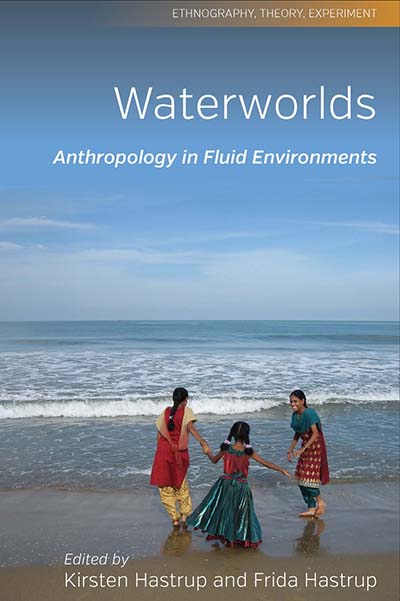 WATERWORLDS
WATERWORLDS
Anthropology in Fluid Environments
Edited by Kirsten Hastrup and Frida Hastrup
Volume 3, Ethnography, Theory, Experiment
In one form or another, water participates in the making and unmaking of people’s lives, practices, and stories. Contributors’ detailed ethnographic work analyzes the union and mutual shaping of water and social lives. This volume discusses current ecological disturbances and engages in a world where unbounded relationalities and unsettled frames of orientation mark the lives of all, anthropologists included. Water emerges as a fluid object in more senses than one, challenging anthropologists to foreground the mutable character of their objects of study and to responsibly engage with the generative role of cultural analysis.
 TOURISM AND INFORMAL ENCOUNTERS IN CUBA
TOURISM AND INFORMAL ENCOUNTERS IN CUBA
Valerio Simoni
Foreword by Nelson Graburn
Volume 38, New Directions in Anthropology
Based on a detailed ethnography, this book explores the promises and expectations of tourism in Cuba, drawing attention to the challenges that tourists and local people face in establishing meaningful connections with each other. Notions of informal encounter and relational idiom illuminate ambiguous experiences of tourism harassment, economic transactions, hospitality, friendship, and festive and sexual relationships. Comparing these various connections, the author shows the potential of touristic encounters to redefine their moral foundations, power dynamics, and implications, offering new insights into how contemporary relationships across difference and inequality are imagined and understood.
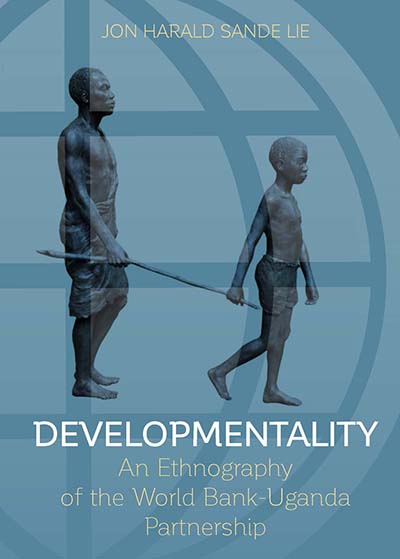 DEVELOPMENTALITY
DEVELOPMENTALITY
An Ethnography of the World Bank-Uganda Partnership
Jon Harald Sande Lie
Drawing on ethnographic fieldwork within the World Bank and a Ugandan ministry, this book critically examines how the new aid architecture recasts aid relations as a partnership. While intended to alter an asymmetrical relationship by fostering greater recipient participation and ownership, this book demonstrates how donors still seek to retain control through other indirect and informal means. The concept of developmentality shows how the World Bank’s ability to steer a client’s behavior is disguised by the underlying ideas of partnership, ownership, and participation, which come with other instruments through which the Bank manipulates the aid recipient into aligning with its own policies and practices.
Read Introduction: Introducing Developmentality
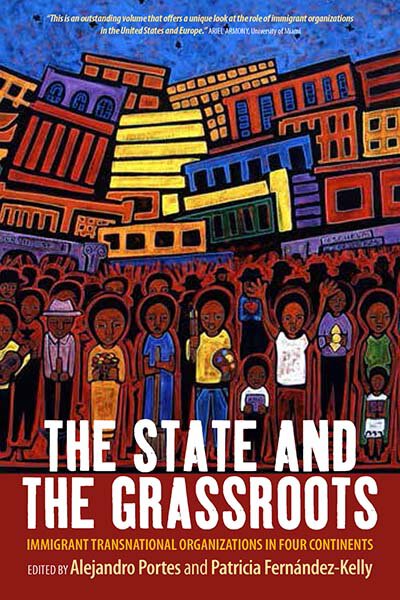 THE STATE AND THE GRASSROOTS
THE STATE AND THE GRASSROOTS
Immigrant Transnational Organizations in Four Continents
Edited by Alejandro Portes and Patricia Fernández-Kelly
Whereas most of the literature on migration focuses on individuals and their families, this book studies the organizations created by immigrants to protect themselves in their receiving states. Comparing eighteen of these grassroots organizations formed across the world, from India to Colombia to Vietnam to the Congo, researchers from the United States, Belgium, France, the Netherlands, and Spain focus their studies on the internal structure and activities of these organizations as they relate to developmental initiatives. The book outlines the principal positions in the migration and development debate and discusses the concept of transnationalism as a means of resolving these controversies.
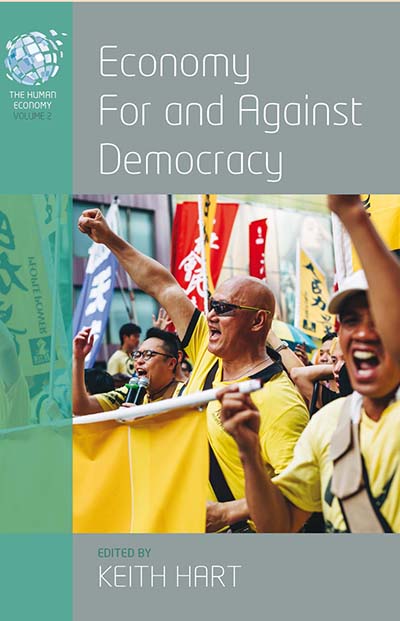 ECONOMY FOR AND AGAINST DEMOCRACY
ECONOMY FOR AND AGAINST DEMOCRACY
Edited by Keith Hart
“[This book] sets out debates and insights that have been long forgotten in social science as a result of the domination of orthodox economics. Absent is the arcane mathematical formalism that commands mainstream enquiry into economics; in these chapters, the study of economics speaks to – and of – people and their daily struggles. In a phrase not to be killed with over-use: this is a liberating read.” · Peter Vale, University of Johannesburg
Read Introduction
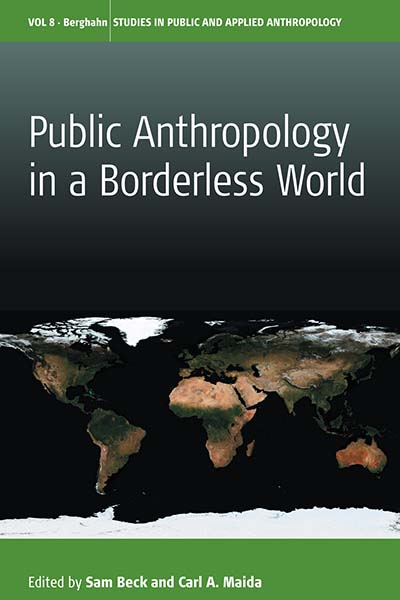 PUBLIC ANTHROPOLOGY IN A BORDERLESS WORLD
PUBLIC ANTHROPOLOGY IN A BORDERLESS WORLD
Edited by Sam Beck and Carl A. Maida
Volume 8, Studies in Public and Applied Anthropology
Anthropologists have acted as experts and educators on the nature and ways of life of people worldwide, working to understand the human condition in broad comparative perspective. As a discipline, anthropology has often advocated — and even defended — the cultural integrity, authenticity, and autonomy of societies across the globe. Public anthropology today carries out the discipline’s original purpose, grounding theories in lived experience and placing empirical knowledge in deeper historical and comparative frameworks. This is a vitally important kind of anthropology that has the goal of improving the modern human condition by actively engaging with people to make changes through research, education, and political action.
Read Introduction
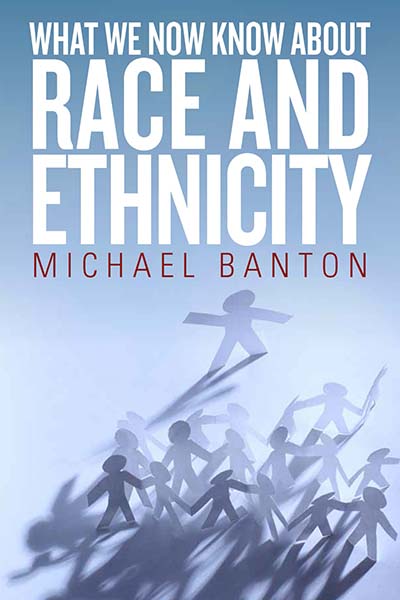 WHAT WE NOW KNOW ABOUT RACE AND ETHNICITY
WHAT WE NOW KNOW ABOUT RACE AND ETHNICITY
Michael Banton
Attempts of nineteenth-century writers to establish “race” as a biological concept failed after Charles Darwin opened the door to a new world of knowledge. Yet this word already had a place in the organization of everyday life and in ordinary English language usage. This book explains how the idea of race became so important in the USA, generating conceptual confusion that can now be clarified. Developing an international approach, it reviews references to “race,” “racism,” and “ethnicity” in sociology, anthropology, philosophy, and comparative politics and identifies promising lines of research that may make it possible to supersede misleading notions of race in the social sciences.
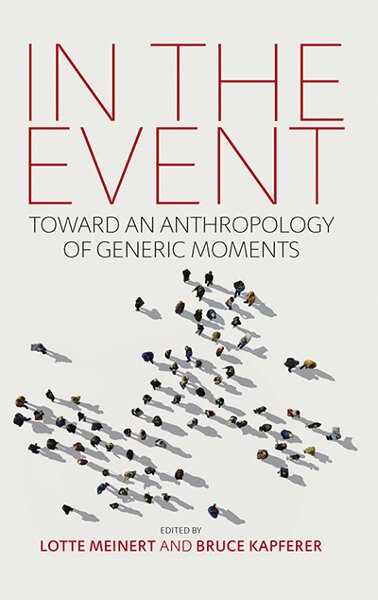 IN THE EVENT
IN THE EVENT
Toward an Anthropology of Generic Moments
Edited by Lotte Meinert and Bruce Kapferer
Events are “generative moments” in at least three senses: events are created by and condense larger-scale social structures; as moments, they spark and give rise to new social processes; in themselves, events may also serve to analyze social situations and relationships. Based on ethnographic studies from around the world—varying from rituals and meetings over protests and conflicts to natural disasters and management—this volume analyzes generative moments through events that hold the key to understanding larger social situations. These events—including the Ashura ritual in Bahrain, social cleavages in South Africa, a Buddhist cave in Nepal, drought in Burkina Faso, an earthquake in Pakistan, the cartoon crisis in Denmark, corporate management at Bang & Olufsen, protest meetings in Europe, and flooding and urban citizenship in Mozambique—are not simply destructive disasters, crises, and conflicts, but also generative and constitutive of the social.
Read Introduction: In the Event—toward an Anthropology of Generic Moments
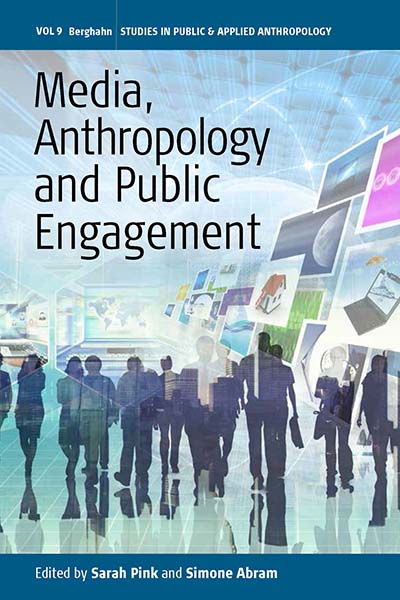 MEDIA, ANTHROPOLOGY AND PUBLIC ENGAGEMENT
MEDIA, ANTHROPOLOGY AND PUBLIC ENGAGEMENT
Edited by Sarah Pink and Simone Abram
Volume 9, Studies in Public and Applied Anthropology
Contemporary anthropology is done in a world where social and digital media are playing an increasingly significant role, where anthropological and arts practices are often intertwined in museum and public intervention contexts, and where anthropologists are encouraged to engage with mass media. Because anthropologists are often expected and inspired to ensure their work engages with public issues, these opportunities to disseminate work in new ways and to new publics simultaneously create challenges as anthropologists move their practice into unfamiliar collaborative domains and expose their research to new forms of scrutiny. In this volume, contributors question whether a fresh public anthropology is emerging through these new practices.
Read Introduction: Mediating Publics and Anthropology: An Introduction
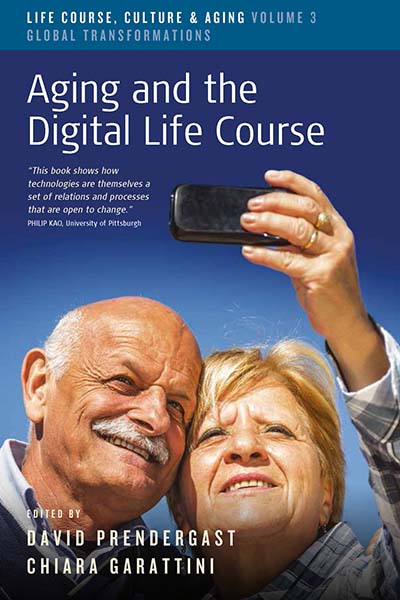 AGING AND THE DIGITAL LIFE COURSE
AGING AND THE DIGITAL LIFE COURSE
Edited by David Prendergast and Chiara Garattini
Volume 3, Life Course, Culture and Aging: Global Transformations
Across the life course, new forms of community, ways of keeping in contact, and practices for engaging in work, healthcare, retail, learning and leisure are evolving rapidly. Breaking new ground in the study of technology and aging, this book examines how developments in smart phones, the internet, cloud computing, and online social networking are redefining experiences and expectations around growing older in the twenty-first century. Drawing on contributions from leading commentators and researchers across the world, this book explores key themes such as caregiving, the use of social media, robotics, chronic disease and dementia management, gaming, migration, and data inheritance, to name a few.
Read Introduction: Critical Reflections on Ageing and Technology in the Twenty-First Century
 WHAT IS EXISTENTIAL ANTHROPOLOGY?
WHAT IS EXISTENTIAL ANTHROPOLOGY?
Edited by Michael Jackson and Albert Piette
What is existential anthropology, and how would you define it? What has been gained by using existential perspectives in your fieldwork and writing? Editors Michael Jackson and Albert Piette each invited anthropologists on both sides of the Atlantic to address these questions and explore how various approaches to the human condition might be brought together on the levels of method and of theory. Both editors also bring their own perspective: while Jackson has drawn on phenomenology, deploying the concepts of intersubjectivity, lifeworld, experience, existential mobility, and event, Piette has drawn on Heidegger’s Dasein-analysis, and developed a phenomenographical method for the observation and description of human beings in their singularity and ever-changing situations.
Read Introduction: Anthropology and the Existential Turn
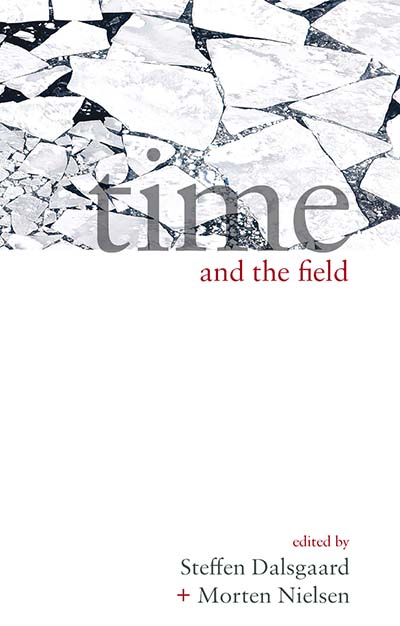 TIME AND THE FIELD
TIME AND THE FIELD
Edited by Steffen Dalsgaard and Morten Nielsen
Afterword by George Marcus
In recent years, ethnographic fieldwork has been subjected to analytical scrutiny in anthropology. Ethnography remains anchored in tropes of spatiality with the association between field and fieldworker characterized by distances in space. With updates on the discussion of contemporary requirements to ethnographic research practice, Time and the Field rethinks the notion of the field in terms of time rather than space. Such an approach not only implies a particular attention to the methodology of studying local (social and ontological) imaginaries of time, but furthermore destabilitizes the relationship between fieldworker and fieldsite, allowing it to emerge as a dynamic and ever-shifting contellation.
Read Introduction: Time and the Field
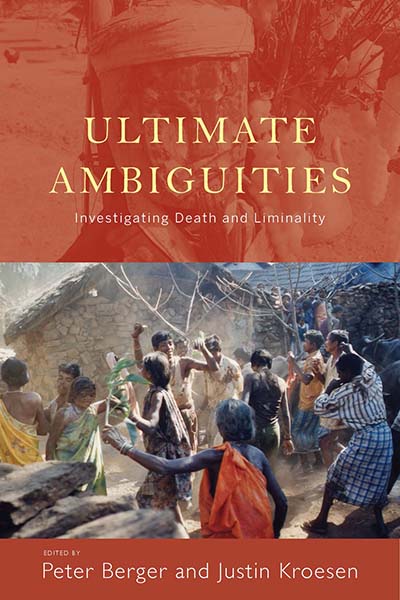 ULTIMATE AMBIGUITIES
ULTIMATE AMBIGUITIES
Investigating Death and Liminality
Edited by Peter Berger and Justin Kroesen
Periods of transition are often symbolically associated with death, making the latter the paradigm of liminality. Yet, many volumes on death in the social sciences and humanities do not specifically address liminality. This book investigates these “ultimate ambiguities,” assuming they can pose a threat to social relationships because of the disintegrating forces of death, but they are also crucial periods of creativity, change, and emergent aspects of social and religious life. Contributors explore death and liminality from an interdisciplinary perspective and present a global range of historical and contemporary case studies outlining emotional, cognitive, artistic, social, and political implications.
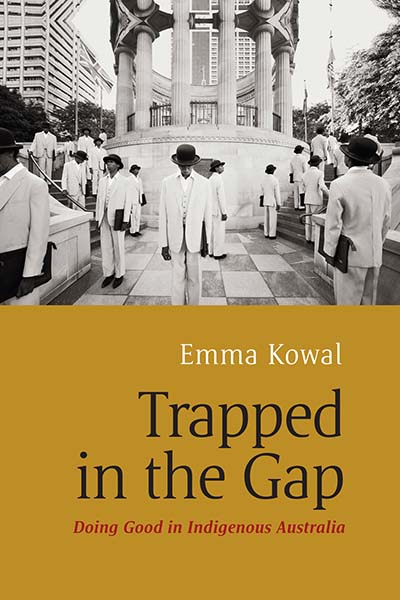 TRAPPED IN THE GAP
TRAPPED IN THE GAP
Doing Good in Indigenous Australia
Emma Kowal
In Australia, a ‘tribe’ of white, middle-class, progressive professionals is actively working to improve the lives of Indigenous people. This book explores what happens when well-meaning people, supported by the state, attempt to help without harming. ‘White anti-racists’ find themselves trapped by endless ambiguities, contradictions, and double binds — a microcosm of the broader dilemmas of postcolonial societies. These dilemmas are fueled by tension between the twin desires of equality and difference: to make Indigenous people statistically the same as non-Indigenous people (to ‘close the gap’) while simultaneously maintaining their ‘cultural’ distinctiveness. This tension lies at the heart of failed development efforts in Indigenous communities, ethnic minority populations and the global South. This book explains why doing good is so hard, and how it could be done differently.
Read Introduction
_______________________________
New in Paperback:
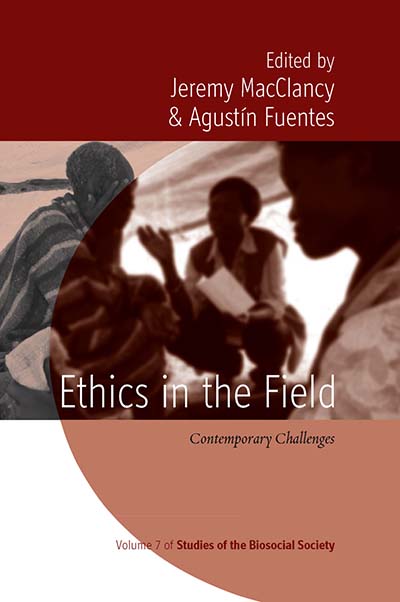 ETHICS IN THE FIELD
ETHICS IN THE FIELD
Contemporary Challenges
Edited by Jeremy MacClancy and Agustín Fuentes
Volume 7, Studies of the Biosocial Society
“This book will be informative and helpful for anyone planning to do fieldwork in the social sciences. It is particularly appropriate for environmental or ecological anthropologists because of the often inter- and trans-disciplinary nature of their work and because it covers ethical and methodological issues similar to those they may encounter. Although not an introductory book on field ethics, it would be valuable for advanced undergraduate or graduate students who have previously been introduced to these issues, or as a valued addition to other more basic materials on the subject.” · Journal of Ecological Anthropology
Chapter 1.The ethical fieldworker, and other problems
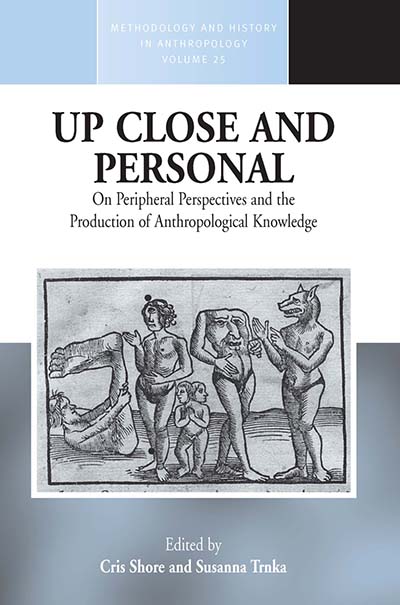 UP CLOSE AND PERSONAL
UP CLOSE AND PERSONAL
On Peripheral Perspectives and the Production of Anthropological Knowledge
Edited by Cris Shore and Susanna Trnka
Volume 25, Methodology & History in Anthropology
“The book offers both unsettling and highly inspirational reading material, especially forvacademics emerging from the world’s metropolises. It raises issues that are frequently overlooked and which represent unavoidable starting points for those doing anthropology today in the Antipodes and elsewhere.” · Social Anthropology/Anthropologie sociale
Introduction: Observing Anthropologists: Professional Knowledge, Practice and Lives
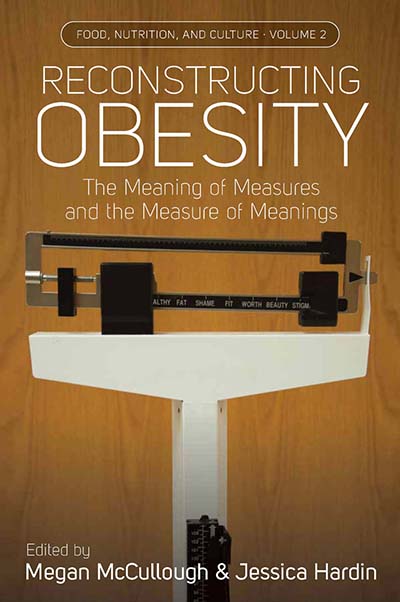 RECONSTRUCTING OBESITY
RECONSTRUCTING OBESITY
The Meaning of Measures and the Measure of Meanings
Edited by Megan McCullough and Jessica Hardin
Afterword by Stephen T. McGarvey
Volume 2, Food, Nutrition, and Culture
“This is not a book that seeks to discredit health research and leave others to do the work of finding a better way to conduct it; rather, it aims to improve health research by providing useful avenues for critique and suggestions for ways forward. In this sense, it works as a very practical guide for those working in the health professions, whether as researchers or healthcare providers, to better understand “obesity” and “overweight” and, importantly, fat people in social and environmental context… it makes a welcome and necessary intervention into the business of health research, provision, and discourse, as well as its public reception.” · Fat Studies Journal
 RECONSTRUCTING OBESITY
RECONSTRUCTING OBESITY
The Meaning of Measures and the Measure of Meanings
Edited by Megan McCullough and Jessica Hardin
Afterword by Stephen T. McGarvey
Volume 25, Fertility, Reproduction and Sexuality
“Pregnancy in Practice is a feminist contribution to the anthropology of reproduction in that it explores the quotidian experiences of pregnant women…While her sample is by no means statistically representative of the experiences of American women, the women in her ethnography represent the normative prenatal experience in America. Han successfully demonstrates that the concept of an ‘ordinary’ or ‘norma’ pregnancy is a phantom itself. Because of this work, perhaps we can definitively say that all women have ordinary pregnancies, or perhaps none do.” · Association for Feminist Anthropology Review
Chapter 1. Introduction: Ordinary Pregnancy
RELATED INTEREST FROM BERGHAHN JOURNALS
Anthropology Journals
Individuals may receive online-only subscriptions to any journal for just $34.95/year! Students may receive online-only subscriptions for just $19.95/year! That means students can get a year’s worth of unlimited access to any journal for less than $20.
Explore our Anthropology Journals here.
Free Virtual Journal Issues
Climate Change Virtual Issue
This issue was compiled in honor of Earth Day and features a wide selection of articles from a range of scholarly anthropology journals such as Anthropology in Action and Cambridge Anthropology.
Émile Durkheim – Special Virtual Issue
This virtual issue features an exclusive selection of Durkheim’s original works, which previosuly appeared in the journal Durkheimian Studies.
Focaal: Forums Virtual issue
A regular feature of the journal Focaal: Journal of Global and Historical Anthropology is its Forum Section. The Forum features assertive, provocative, and idiosyncratic forms of writing and publishing that do not fit the usual format or style of a research-based article in a regular anthropology journal. Forum contributions can be stand-alone pieces or come in the form of theme-cofused collections or discussions. These Forums have been include in this special virtual issue.
Migration Virtual Issue
This virtual issue includes articles from various journals discussing themes of migration, immigration, displacement, labor, and related topics.
Museum Studies Virtual Issue
This virtual issue was made available in honor of Museum Week and highlights a range of articles from a variety of perspectives on topics related to Museum Studies.
Religion and Society: Portraits Special Virtual Issue
Religion and Society: Advances in Research is a scholarly journal that responds to the need for a rigorous, in-depth review of current work in the expanding sub-discipline of the anthropology of religion. Each volume contains a Portrait section that profiles a senior scholar of religion, with invited essays on the scholar’s work by authorities in their respective subfields. This special virtual issue is compiled of a selection of these Portraits.
Regions and Cohesion: Leadership Forums Virtual Issue
Regions and Cohesion is proud to publsih analytical, policy-related contributions from both academics and practitioners in its Leadership Forum sections. These sections highlight well-known dignitaries and aim to create dialogue between academic research and the perspectives of practitioners by publishing analytically normative pieces. For this special virtual issue, we have included the Leadership Forums from each issue.
Articles on Tourism
This issue was assembled in honor of World Tourism Day and is comprised of articles related to travel and tourism.
Scholarly Blogs
EnviroSociety
A multimedia site, EnviroSociety provides insights into contemporary socio-ecological issues with posts from top scholars in the social sciences that engage readers interested in current environmental topics.
FocaalBlog
FocaalBlog is associated with Focaal: Journal of Global and Historical Anthropology. It aims to accelerate and intensify anthropological conversations beyond what a regular academic journal can do, and to make them more widely, globally, and swiftly available.
Berghahn Blog
Berghahn Books’ very own blog page with special discount offers, info about new titles, author interviews, and more.
